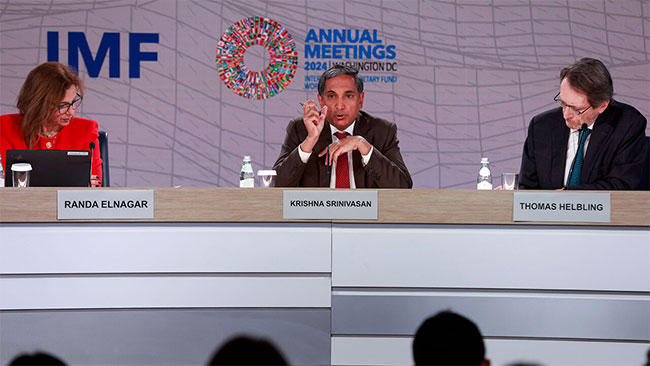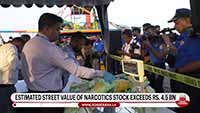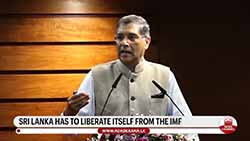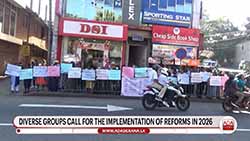Sri Lanka has long way to go to achieve strong, sustainable recovery – IMF
October 25, 2024 01:40 pm
Sri Lanka has made significant progress in implementing economic reforms, positioning itself to advance quickly toward the third review of the Sri Lanka EFF program, which is coming up soon, a senior International Monetary Fund official said on Thursday.
Krishna Srinivasan, director of the International Monetary Fund’s Asia and Pacific Department, noted that when the new government took office recently, he led a high level team to Colombo to discuss and to engage with the authorities.
He stated that they some very productive discussions with the new government and its team and that the discussions are continuing this week during the IMF-World Bank Annual Meetings.
“Now, there was broad consensus, I would say unanimous consensus, that Sri Lanka, which was tearing at the abyss in 2022, has come a long way in terms of undertaking reforms which have led to some hard won gains, as you can know.”
“You’ll note that growth has been positive the last four quarters. Inflation is coming down. So there is consensus that the new government, you know from the new government that it would like to safeguard and build on the hard won gains under the program,” Srinivasan said.
He stated that under the Extended Fund Facility (EFF) program they have elements which address some of the priorities of the new government, including in terms of social protection and so on.
But the details on the program are continuing and they’ll be happening this week in Washington, he added.
“And we are encouraged by what we have heard so far and hoping that, you know, we can move fast towards the third review which will come up soon,” he told a press briefing during the IMF and World Bank annual meetings in Washington.
In response to a question on Sri Lanka’s debt restructuring, Srinivasan noted that the government has reached agreements with the official creditors, an agreement in principle with the private creditors and that the next step would be to reach a formal agreement with all creditors.
“And that’s a big step forward. And of course that’s not the end. There’s a lot more work to be done in terms of continuing with the reforms because a long way to go before you’re on the path of strong and sustainable recovery,” he emphasized.
Asked about macro linked bonds, he stated this is something which is a negotiation between the country’s creditors, the country’s advisors and the creditors.
“We don’t get involved in the kind of instruments that they negotiate on and so on and so forth. What we are concerned about is whether these instruments and the restructuring they reach are one consistent with our program targets on debt and so on, and that there’s comparability of treatment across creditors.”
However, he acknowledged that macro linked bonds have become popular and that it all depends, country to country, how the creditors and advisors go about it.
“So it’s not for me to say that this is going to be the future of all debt restructuring. It varies from country to country. We’ve seen plain vanilla bonds being exchanged and you have these kind of bonds in other countries,” Srinivasan said.












